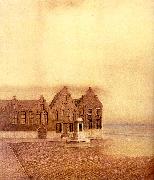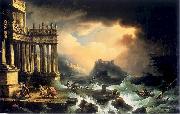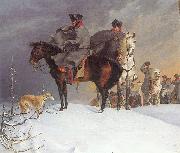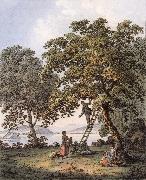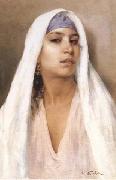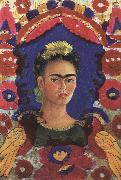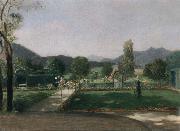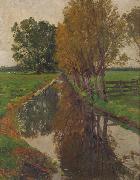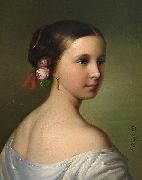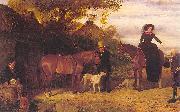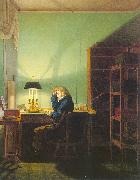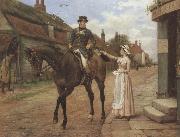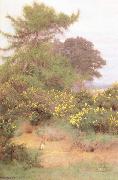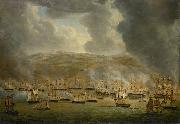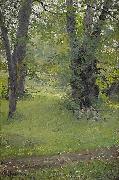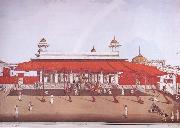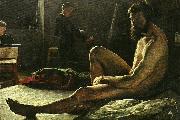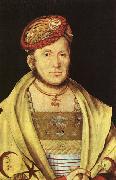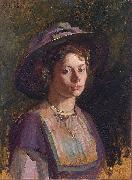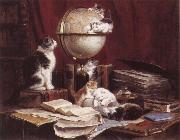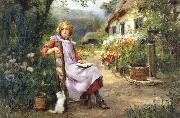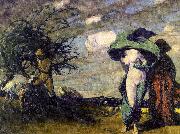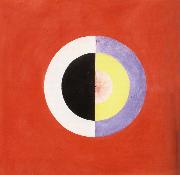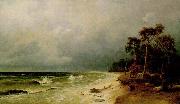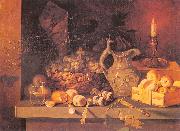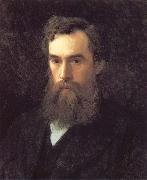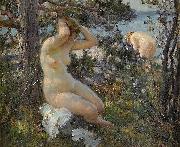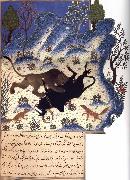|
|
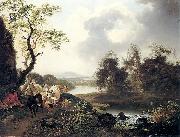 |
Ferdinand Kobell
|
|
(born in Mannheim, 7 June 1740; died in Munich, 1 February 1799) was a German painter and engraver.
He was studying at the University of Heidelberg when the Elector of Bavaria, admiring a landscape, aided him to devote his entire time to painting. He became the pupil of Peter Verschaffelt. He next studied art in Paris (1768-1769). On his return, he was appointed painter to the Cabinet (court painter), and later professor at the Academy. In 1793, he moved to Munich. He was appointed director of the Mannheim Gallery (1798) but died before entering on his duties.
|
|
|
|
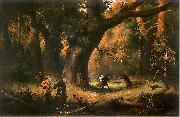 |
Franciszek Kostrzewski
|
|
(19 April 1826 in Warsaw - 30 September 1911 in Warsaw) was a Polish painter, illustrator and caricaturist.
He was born in Warsaw, Congress Poland, Russian Empire. Among his works are paintings illustrating the epic poem Pan Tadeusz. He died in Warsaw.
|
|
|
|
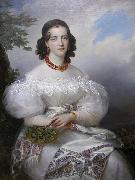 |
Francois Joseph Kinson
|
|
François-Joseph Kinson (1771-1839) was a Flemish painter.
Kinson attended art school at Bruges and soon established a reputation in Ghent and Brussels. He exhibited a portrait in Paris in 1799. Settling in Paris after the exhibition, the artist courted the favor of the rich and famous of the time. Kinson worked for Napoleones court and eventually became court painter to Jerôme Bonaparte, King of Westphalia. Kinson is best remembered for his portraits of elegant women. The artist worked as a court painter in Paris until 1830, and died in 1839 at the age of 68.
|
|
|
|
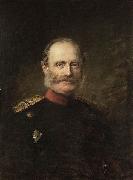 |
Franz Kops
|
|
painted Ir. konigl. Hoheit Prinz Georg, Herzog zu Sachsen im Jahre 1895 - Studie nach dem Leben in 1895 |
|
|
|
|
|
|
|
|
|
|
|
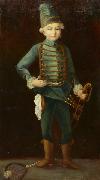 |
Friedrich August von Kaulbach
|
|
(2 June 1850, Hannover - 26 July 1920, Munich, Germany) was a German portraitist and historical painter. He was the son of Theodor Friedrich Wilhelm Christian Kaulbach (1822 - 1903), the court painter at Hannover, and the great nephew of Wilhelm Kaulbach, another prominent member of the Kaulbach family of artists. He learned to paint from his father, and later was a student of August von Kreling at Nuremberg. He sought to emulate the artist Hans Holbein. |
|
|
|
|
|
|
|
|
|
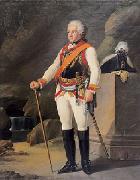 |
Georg Melchior Kraus
|
|
(26 July 1737, Frankfurt am Main - 5 November 1806, Weimar) was a German painter. A student of Johann Heinrich Tischbein, he was also a teacher himself (his pupils included Ferdinand Jagemann), as well as an entrepreneur and friend of Goethe. He was a co-founder of the Ferstliche freie Zeichenschule Weimar with Friedrich Justin Bertuch in 1776.
|
|
|
|
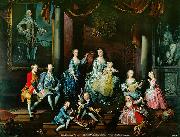 |
George Knapton
|
|
George Knapton (1698-1778) was an English portrait painter and the first portraitist for the Society of Dilettanti in the 1740s. He became Surveyor and Keeper of the King's Pictures from 1765-1778.
Knapton was born in London, the son of James Knapton, a Bookseller of Ludgate street. He studied art under Jonathan Richardson, then at the St. Martin's Lane Academy. He spent some years in Italy where he became known as a sound judge of the works of the "Old Masters". An account of his vist to Herculaneum was published in the "Philosophical Transactions" of 1740 (no. 458).
Knapton was an original member of the "Society of Dilettanti" and their first portrait artist. He painted many members of the society - mostly in fancy dress - including the Duke of Dorset, Viscount Galway, Sir Francis Dashwood, the Earl of Holdernesse, Earl of Bessborough and Sir Bourchier Wray. Knapton resigned his position at the society in 1763.
In 1750, the then Prince of Wales commissioned Knapton, together with George Vertue, to produce a catalogue of the pictures at Kensington Palace, Hampton Court and Windsor castle. In 1765, he succeeded Stephen Slaughter as Surveyor and Keeper of the King's Pictures; he was also in charge of Lord Spencer's collection at Althorp, Northamptonshire.
The Family of Frederick, Prince of Wales (1751)Knapton's largest painting was that of the widowed Princess of Wales and her family (1751). He also painted portraits of the Earl of Upper Ossory (with his brother and sister), the Earl of Burlington, Admiral Sir John Norris, Francis, Fifth Duke of Leeds, Admiral George Vandeput, Archibald Bower, Nicolas Tindal, Hildebrand Jacob, Admiral Edward Hawke, and the singers Carestini and Lisabetta du Parc.
Kanpton assisted his brothers, John and Paul - who had succeeded to and extended their father's business - in the production of several publications including works by Thomas Birch and "The History of England" by Nicolas Tindal and Paul de Rapin.
Knapton died in Kensington in December 1778 and was buried there on the 28th of that same month. |
|
|
|
|
|
|
|
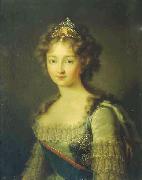 |
Gerhard von Kugelgen
|
|
Franz Gerhard von Kegelgen (February 26, 1772 - March 27, 1820) was a German painter, noted for his portraits and history paintings. He was a professor at the Academy of Arts in Dresden and a member of both the Prussian and Russian Academies of Arts. His twin brother, Karl von Kegelgen, was also a painter of note.
Gerhard von Kegelgen was born at Bacharach am Rhein. After leaving school in 1789, he studied painting in Koblenz. Beginning in 1791, he worked in Bonn, where he painted portraits of Elector Archduke Maximilian Franz of Austria, minister Ferdinand August von Spiegel zum Desenberg, and the Earl of Waldstein. Afterwards, Gerhard von Kegelgen and his brother undertook an educational journey to Rome, Munich and Riga, which was financed by Maximilian Franz of Habsburg.
In 1800, Kegelgen married Helene Marie Zoege von Manteuffel. They had three children together. His first son, Wilhelm was born in Saint Petersburg in 1802, and also grew up to become a painter. The other children were Gerhard (born 1806), and Adelheid (born 1808).
|
|
|
|
|
|
|
|
 |
Hans Knieper
|
|
painted Portrait of Frederick II of Denmark and Norway in 1581
|
|
|
|
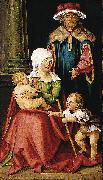 |
Hans von Kulmbach
|
|
(real name Hans Suess or Hans Seß) was born around 1480 in Kulmbach, Franconia and died previous to Dec. 3, 1522 in Nuremberg. Hans von Kulmbach was the artist who created the Krakew St. John's Altar.
Kulmbach probably arrived in Nuremberg around 1505. He received instruction by Jacopo de' Barbari, who for a time worked in Nuremberg. Von Kulmbach then apprenticed with Albrecht Derer and after Derer retired from painting altarpieces in 1510 Kulmbach took over most of his commissions. Kulmbach had his own workshop in Nuremberg and at times worked in Krakew. He also created artworks for emperor Maximilian I and for Margrave Casimir Hohenzollern von Brandenburg-Kulmbach. His best works were stained-glass windows in churches, such as the Maximilian stained-glass, Margrave stained-glass at St. Sebald in Nuremberg, the Welser stained-glass at the Frauenkirche and the Nikolaus altar at Lorenzkirche. In 1511 he finished the St. Mary's altar at Skałka in Krakew. The Catherine and St. John's altar also in Krakew, are among his best works.
|
|
|
|
|
|
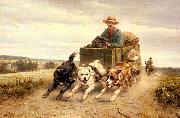 |
Henriette Ronner-Knip
|
|
was a Dutch painter.
Born Henriëtte Knip in Amsterdam, she moved at a young age to Den Bosch and was until 1850 active in Sint-Michielsgestel and Boxtel. That year she married Feico Ronner and moved to Belgium, first to Brussels and in 1878 to Elsene. She studied with her father, Joseph August Knip.
She was best known for her paintings of subjects from nature, especially cats and dogs.
|
|
|
|
|
|
|
|
|
|
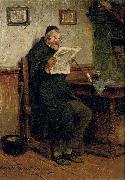 |
Hugo Wilhelm Kauffmann
|
|
(7 August 1844 - 30 December 1915) was a German painter, the son of Hermann Kauffmann.
Kauffmann was born in Hamburg. In 1861 he went to Frankfurt and worked there under Jakob Becker, Edward Jakob von Steinle and Johann Nepomuk Zwerger. From 1863-71 he lived in Kronberg in the Taunus. During this time he spent one winter in Hamburg and a five-month period in Desseldorf too; afterwards he spent 1½ years in Paris, until 1870 when the war drove him out. He lived until 1871 in Munich. He died in Prien at the Chiemsee in 1915.
|
|
|
|
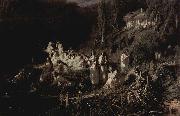 |
Ivan Kramskoi
|
|
(June 8 (O.S. May 27), 1837 C April 6 (O.S. March 24), 1887) |
|
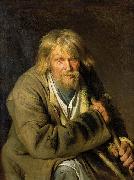 |
Ivan Nikolaevich Kramskoi
|
|
(June 8 (O.S. May 27), 1837 - April 6 (O.S. March 24), 1887; was a Russian painter and art critic. He was an intellectual leader of the Russian democratic art movement in 1860-1880.
Kramskoi came from a poor petty-bourgeois family. From 1857 to 1863 he studied at the St. Petersburg Academy of Arts; he reacted against academic art and was an initiator of the "revolt of fourteen" which ended with the expulsion from the Academy of a group of its graduates, who organized the Artel of Artists
Influenced by the ideas of the Russian revolutionary democrats, Kramskoi asserted the high public duty of the artist, principles of realism, and the moral substance and nationality of art. He became one of the main founders and ideologists of the Company of Itinerant Art Exhibitions (or Peredvizhniki). In 1863-1868 he taught at the drawing school of a society for the promotion of applied arts. He created a gallery of portraits of important Russian writers, scientists, artists and public figures (Lev Nikolaevich Tolstoy, 1873, Ivan Shishkin, 1873, Pavel Mikhailovich Tretyakov, 1876, Mikhail Saltykov-Shchedrin, 1879, Sergei Botkin, 1880) in which expressive simplicity of composition and clarity of depiction emphasize profound psychological elements of character. Kramskoi's democratic ideals found their brightest expression in his portraits of peasants, which portrayed a wealth of character-details in representatives of the common people.
In one of Kramskoi's most well known paintings, Christ in the Desert (1872, Tretyakov gallery), he continued Alexander Ivanov's humanistic tradition by treating a religious subject in moral Cphilosophical terms. He imbued his image of Christ with dramatic experiences in a deeply psychological and vital interpretation, evoking the idea of his heroic self-sacrifice.
Aspiring to expand the ideological expressiveness of his images, Kramskoi created art that existed on the cusp of portraiture and genre-painting ("Nekrasov during the period of 'Last songs,'" 1877-C78; "Unknown Woman," 1883; "Inconsolable grief," 1884; all in Tretyakov gallery). These paintings disclose their subjects' complex and sincere emotions, their personalities and fates. The democratic orientation of Kramskoi's art, his acute critical judgments about it, and his persistent quest for objective public criteria for the evaluation of art exerted an essential influence on the development of democratic art and aesthetics in Russia in the last third of the nineteenth century.
|
|
|
|
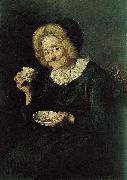 |
Ivana Kobilca
|
|
Ivana Kobilca (20 December 1861 - 4 December 1926) was a Slovene realist painter who lived, worked and studied in various European cities including Vienna, Sarajevo, Berlin, Paris and Munich. She was a member of Societe Nationale des Beaux Arts in Paris. Many of her paintings are still lifes, portraits or country settings. She later tended toward impressionism.
Her best known paintings are Kofetarica (Coffeemadam), 1888; Citrarica (The Zitherist), Likarice (Women Ironers), 1891; Holandsko dekle (A Dutch Girl), Portret sestre Fani (Portrait of Sister Fani), 1889; and Poletje (Summer), 1889. |
|
|
|
|
|
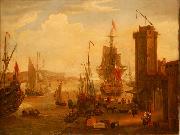 |
Jacob Knyff
|
|
(January 1, 1639, Haarlem - 1681, London), was a Dutch Golden Age painter.
According to Houbraken he was the teacher of Johannes Gottlieb Glauber in Paris in 1671, where he attended the funeral of Nicolaes Berchem II on January 4, 1672. he was probably the son of the painter Wouter Knijff, and is known for painting landscapes and seascapes |
|
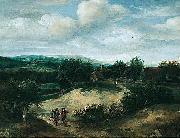 |
Jacob Koninck
|
|
(c. 1615, Amsterdam - c. 1695, Copenhagen), was a Dutch Golden Age landscape painter.
According to Houbraken he lent his books on perspective to Johannes Verkolje, who became better than he was at perspective drawing.He was a disciple of Adriaen van de Velde who became a popular painter in Copenhagen where he painted for the court of Christian V of Denmark.
According to the RKD he was the uncle of Salomon Koninck, a pupil of David Colijns and became the teacher of his son Jacob II and his younger brother Philips Koninck.He was in Dordrecht from 1633-1636, Rotterdam from 1637-1645, The Hague from 1647-1651, back in Amsterdam in 1658 (when he probably lent young Verkolje his perspective books), and moved to Denmark in 1676.
|
|
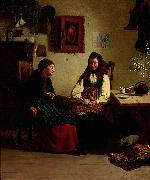 |
Jakob Kulle
|
|
painted Allmogeinterior med kaffedrickande kvinnor in 1876 |
|
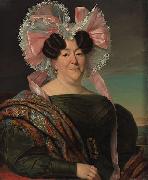 |
Jan Adam Kruseman
|
|
Petrus Augustus de Genestet (P.A. de Genestet) (Amsterdam, November 21, 1829 - Rozendaal, July 2, 1861) was a Dutch poet and a theologian.
Petrus Augustus de Genestet lost both of his parents at a very young age; after that he lived with his uncle, the Dutch painter Jan Adam Kruseman. He studied at the Amsterdamse Atheneum and the Seminarium der Remonstrantse Broederschap to become a preacher. He became minister in March of 1852 at the Genestetkerk (Genestetchurch) that was named after him, in Delft. In the same year he got married to Henriette Bienfait in Bloemendaal. They had two children. In 1859, he lost both his wife and oldest child died of tubercolosis, and because of his poor health he had to quit working as a minister. He moved to Amsterdam, but spent most of his summers in Bloemendaal. Two years later, in 1861, he died in Rozendaal. |
|
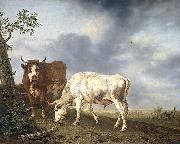 |
Jan Kobell
|
|
(born Delfshaven, 1779; died Amsterdam, 14 September 1814) was a Dutch animal and landscape painter.
He was a pupil of Willem Rutgaart van der Wall at Utrecht. He studied diligently from nature, and took Paul Potter for his model, acquiring his talent for animal as well as landscape work. In 1812 he went to Paris, where he won the gold medal and high praise from art critics. His popularity increased rapidly until his premature death. Of his cattle pieces, noted for their technique and precision of drawing, there are excellent specimens in the museums of Amsterdam and Rotterdam.
|
|
|








